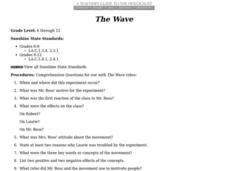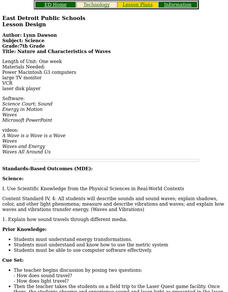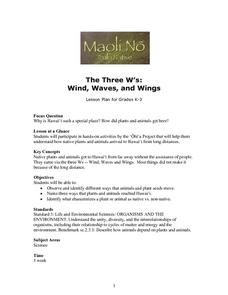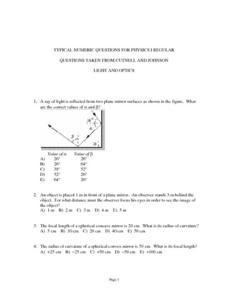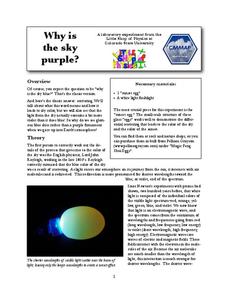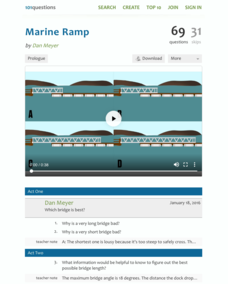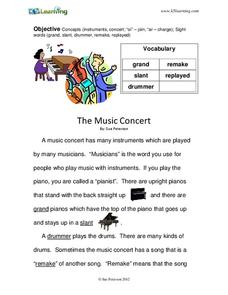NASA
Taking a Cold, Clear Look at the Universe
Take a look with another perspective. Pupils read to find out what portion of the electromagnetic spectrum a space telescope sees and the difficulties of viewing infrared radiation from other objects in space. Individuals discover how...
Curated OER
The Wave
After watching the video, The Wave, middle and high schoolers answer each of these 23 questions that have to do with the film.
Curated OER
Radio Waves
In this radio waves instructional activity, students read about how broadcasting uses radio waves to deliver sound and how radio signals are received. Then students complete 3 short answer questions.
Curated OER
Nature and Characteristics of Waves
Seventh graders research different types of waves, identify the parts of a wave and create a Power Point presentation demonstrating what they have learned.
Curated OER
What Really Matters When it Comes to Sound?
Students conduct experiments to learn about sound wave vibrations in objects and pitch. Students test how varying the volume of water in a vessel changes frequency and pitch.
Curated OER
Properties of Waves
Third graders observe and investigate wave properties and compare the properties of particles and waves. They fill a pie pan half full with water, place a toothpick in the center of the pie pan, then drop a marble into the pan and...
Curated OER
Sound Waves
Sixth graders discover how sound is made from vibration and moves in all directions from the source in waves. They see that sound waves can be "seen" if they are translated into light. An excellent experiment is imbedded in this...
Curated OER
Lesson 3-Explore/Explain Do You Hear What I Hear?
Young scholars explore how loudness is measured. They identify the decibel scale and explain the amplitude of the sound wave.
Curated OER
What Does Motion Have to do with Sound?
Second graders investigate and explore sound energy. They investigate how the vibrational motion moves through matter in waves. Students describe sounds and vibrations. They observe that vibrational motion creates sounds. Students record...
Curated OER
The Three W's: Wind, Waves, and Wings
Students participate in hands-on acticities to understand how native plants and animals arrived on Hawaii from long distances without the assistance of man. They then identify what characterizes a plant or animal as native vs. non-native.
Curated OER
Wonderful Waves
In this science worksheet, students perform an investigation about sound waves and vibration. Students use a pan of water and toothpicks to make and observe ripples. Students answer 4 essay questions about their observations.
Curated OER
Writing a Plan for Wave Observation
In this observation worksheet, students practice writing a plan for observing waves including the instruments used, the objective of the observations and the process used to collect data.
Curated OER
Standing Waves
In this waves worksheet, students learn about standing waves and harmonics. Then students complete 11 matching, 15 fill in the blank, and 7 short answer questions.
Curated OER
Checking the Surf
Learners read and discuss waves and their wavelengths and amplitudes. In this waves lesson plan, students draw the wavelength and amplitude of a wave and discuss tsunamis and storms.
Curated OER
Marine Fisheries Management
Almost 200 slides make this a vast collection! It is a quirky collection, titled "Marine Fisheries Management," but having little to do with that occupation. What you will find are two-toned blue backgrounds with no pictures, but a few...
Curated OER
Motion in the Ocean
How does the formation of currents and waves in the ocean happen? High schoolers will learn about the primary causes for ocean currents and waves by calculating a wave's amplitude and nautical mile speed. Then they will complete a...
Exploratorium
Moire Patterns
By overlapping combs and window screening and by looking at a printed set of consecutively larger circles, learners observe Moire patterns, which provide a visual of what happens during wave interference.
Curated OER
Typical Numeric Questions for Physics I - Light and Optics
Nineteen word problems dealing with frequency, speed, reflection, and refraction of light are provided here. Empower your physics masters to manipulate equations for computing angles, focal lengths, image heights, and more! This is a...
K12 Reader
What Causes Reflections?
Your kids probably use mirrors every day, but do they know how they work? A reading passage about reflection and reflective objects can address both physical science and reading comprehension. Kids read the paragraphs and use context...
Colorado State University
Why Is the Sky Purple?
The color of the sky depends on the time of day. Young scholars experiment with scattering different wavelengths of light to recreate the color of the sky. They observe both the longer blue wavelengths and the shorter red and orange...
Curated OER
What's the Frequency, Roy G. Biv?
Introduce starting space scientists to the electromagnetic spectrum, expecially the portion of visible light. Teach them about wavelength and frequesncy. Then give them a roll of adding machine tape and a manila folder to make a...
Colorado State University
What's the Difference Between Blue Light and Red Light?
Finally, an electromagnetic spectrum lab that will get glowing reviews from your class! Explore the nature of light using red and blue LED sources and fantastic phosphorescent paper. Young scientists compare the effects of blue light...
101 Questions
Marine Ramp
Boat ramps move with waves and changes in water level. Scholars decide on the proper length for a ramp so the angle connecting both sides is appropriate. They visualize the situation and use a simulation to view the results with their...
K5 Learning
The Music Concert
Second graders read an informational text passage on music concerts and then answer questions based on what they read.

